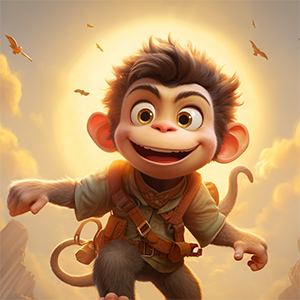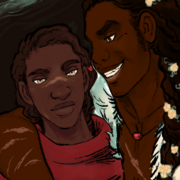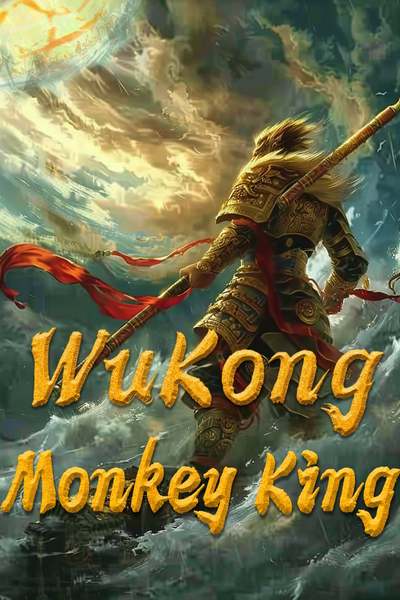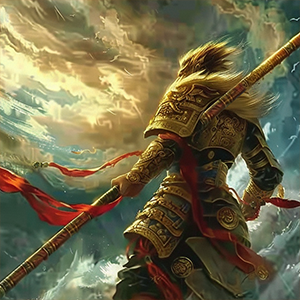A young novice monk led the Stone Monkey down, treating him with utmost respect as he guided him through a bath and change of clothes, then settled him into a chamber within the Zen temple. This level of service was a first for the Stone Monkey; while the monkeys of Flower-Fruit Mountain held him in high regard, they knew nothing of such human rites. This was also the Stone Monkey's first time living in a proper house, surrounded by furniture that radiated an aura of antiquity. He couldn't help but sigh at the unpredictability of life: a single thought could indeed transport one into an entirely different world.
In his previous life, he was Shihou, and now he had become the Stone Monkey. If he hadn't come to this world, Sun Wukong's life would have unfolded exactly as it did in "Journey to the West." But from this point forward, the original narrative of the rebellious monkey who eventually submitted was gone, replaced by him, a false Wukong with knowledge of the story's progression.
After the Stone Monkey was taken away, the Great Sage National Teacher Wang Bodhisattva began to ponder in the main hall. Although the Stone Monkey was a unique creature of heaven and earth, he didn't seem to be of such significance to warrant the attention of the Xuan Tian Shang Di. Why then, would there be an objection to giving him a name?
The Bodhisattva was baffled despite his deep contemplation. No matter how much he tried to apply his cosmic abilities, the more he calculated, the more perplexed he became. Aside from a forthcoming tribulation for the Stone Monkey, everything else seemed as elusive as reflections on water, visible yet untouchable.
Since attaining enlightenment, the Bodhisattva had never encountered such a peculiar situation. The fate of a monkey eluding the calculations of a Taiyi Golden Immortal was indeed strange.
Resigning himself to the mystery, the Bodhisattva took a fig, also known as a "youtan poluo" (a term transcribed from Sanskrit, signifying a mythical flower mentioned in the Lotus Sutra), into his mouth and chewed thoughtfully, appreciating its quality.
Walking to the courtyard, he noticed a blossoming udumbara tree, signifying spiritual omens. The scripture mentioned that the udumbara flowers, blooming once every three thousand years, herald the arrival of a Golden Wheel Cakravartin(Cakravartin, a concept in Buddhism, possesses unparalleled magical powers and safeguards the rules of Buddhism in the world).
Considering the principles of cause and effect in Buddhism, where everything is interconnected, the Bodhisattva wondered if the Stone Monkey's fate was somehow linked to that of a Golden Wheel Cakravartin.
Shaking off the ludicrous thought, he reminded himself that a Golden Wheel Cakravartin, embodying the thirty-two marks of a great man, was a sovereign among kings and Buddhas since the beginning of creation, unlikely to have any connection with a newly born monkey.
Despite further contemplation, the Bodhisattva could not see through the mystery, sighing at the infinite workings of fate beyond his grasp.
The Stone Monkey, in his chamber, carefully examined each exquisitely crafted object, touching them as if he couldn't bear to let go. Yet, his mind never ceased to ponder.
Being brought here by the Great Sage National Teacher Wang Bodhisattva offered temporary shelter, but his fortune remained uncertain. If he could leverage his innate talents as the Stone Monkey to become the Bodhisattva's disciple, he might acquire extraordinary abilities and carve out a new destiny for himself.
Regrettably, his potential initiation was thwarted by a mysterious figure, clearly more powerful than the Bodhisattva, and seemingly aware of the Stone Monkey's fate. Why else would the life and death of a mere monkey concern him?
The Stone Monkey speculated about possible identities—Buddha, Laozi, Bodhi, Guanyin—all potential yet uncertain. Eventually, he gave up, realizing that the curtain on this grand drama had barely lifted, offering no clues. Given his current situation and limited abilities, he decided it was best to conserve his energy.
That night, lying awake on his bed, he felt an indescribable sensation of being watched, an elusive feeling without a source.
Stepping into the courtyard, he saw the eaves adorned with bright pearls lighting up the yard like daylight, surrounded by a fragrant, blossoming garden. Despite the winter below the mountain, it was late spring here, a realm truly befitting immortals.
Under a peach tree, petals danced in the breeze, their aerial journey seemingly reluctant to end. Holding a petal, the Stone Monkey reflected on the transience of life, akin to the fleeting beauty of the blossoms. Life is bustling; death brings serene beauty. Isn't there a certain grace in that sorrow?
What he feared most was a life worse than death.
Contemplating the life of the Monkey King, the Stone Monkey shivered from within. From his birth from stone, to seeking immortality, claiming treasures from the sea, proclaiming himself Equal to Heaven, causing havoc in the Heavenly Palace, and then being suppressed under the Five Elements Mountain, the Monkey King lost his former arrogance and became a cautious servant, ultimately enduring trials, obtaining scriptures, and achieving Buddhahood.
Achieving Buddhahood, then, implies becoming one with emptiness, with nothingness, dissolving into the ether. The Great Sage Equal to Heaven is no more; the Monkey King who caused upheaval in the heavens is gone; the revered eldest disciple is gone; the righteous being who once roared, "Where do you think you're going, demon!" in his tiger-skin skirt has vanished... Even the original Stone Monkey, born of rock and nurtured by the elements, naked and unadorned, has ceased to exist. In their place, a stolid Buddha with half-closed eyes, holding prayer beads, as lifeless as a walking corpse, embodies a Buddha devoid of desires, pain, joy, life, death, increase, decrease, attachments, and detachments.
For the naturally free-spirited and rebellious Monkey King, is this ultimate enlightenment or obliteration?
The more the Stone Monkey pondered, the more frightened he became, unwittingly crushing the peach blossom petal in his hand into oblivion. The fresh juice spilled into his palm, its cool relief fleeting, leaving behind a nearly invisible trace.
Such is fate.
Fate decrees that some things are meant to be, and others not to be forced. The destiny of the Monkey King was predetermined, a path acknowledged by thousands of gods and Buddhas, unchallengeable and irresistible.
And yet, I have my own destiny. Even if I am ground into the dust like this petal, I will not submit to another's path.
That night, the Stone Monkey was not the only one awake.
The Great Sage National Teacher Wang Bodhisattva was conversing with his disciple, Little Prince Zhang, in the inner chamber.
"My disciple, what was the Stone Monkey doing when you saw him?" His tone was gentle and serene, reflecting the Bodhisattva's usual dignified presence.
Little Prince Zhang stood respectfully, "Master, at that time, the Stone Monkey was frozen stiff, unable to move or speak, clearly immobilized by Master's powerful magic."
"Could you discern his level of cultivation?"
"Master, although young, the Stone Monkey possesses the innate talent of a first-grade human immortal. However, he has no cultivation to speak of, which I found peculiar."
"Indeed, you see well."
"And do you know your own level of cultivation?"
"I am of the third grade of celestial immortals," Little Prince Zhang replied, his eyes betraying a flicker of resentment.
"Do you resent your teacher?" the Bodhisattva asked softly.
Little Prince Zhang was shocked, falling to his knees, "Disciple owes all to Master, viewing him as my own father in this life. I dare not harbor any other thoughts."
The Bodhisattva's expression darkened slightly, but he was inwardly pleased. "Rise, what are you saying?" He pondered for a moment before adding, "Considering your years of service, I shall bestow the Stone Monkey's fate upon you."
Little Prince Zhang hastily expressed his gratitude. After a long wait, seeing that his master had entered meditation and would not speak again, he quietly retreated, vanishing as silently as a ghost.
Once Little Prince Zhang had left, the Great Sage National Teacher Wang Bodhisattva slowly opened his eyes, thinking: A first-grade human immortal without any cultivation surely signifies a great fortune. If we could uncover this secret, who knows how beneficial it might be? The Xuan Tian Shang Di's interest in the Stone Monkey might be related to this. Let Little Zhang probe; it's none of my concern.
Annotations:
Great Fortune (大造化): The term "great fortune" here suggests an extraordinary and rare opportunity or blessing that significantly advances one's spiritual cultivation or grants exceptional abilities. In Chinese culture, such fortunes are often linked to destiny, fate, or divine intervention.
Xuan Tian Shang Di(玄天上帝 | Also known as General Zhenwu, Emperor Zhenwu,Xuanwu Emperor): One of the four marshals of Heavenly Palace. Xuan Tian Shang Di is a Taoist deity known for his martial prowess and control over water, often involved in stories of combating evil and protecting the devout. His concern for the stone monkey indicates a special interest or connection, hinting at the monkey's significance within the cosmic or divine order.











Comments (0)
See all